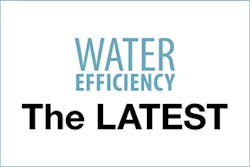Intelligent Water Systems Challenge Launches for Second Year
The Intelligent Water Systems Challenge is back for a second year to encourage participants to use innovation and data to help solve some of the most difficult issues facing water and wastewater utilities.
The goal is to demonstrate the value of intelligent water systems to utilities and foster adoption of smart water technologies, as well as give students, professionals, and technology experts the opportunity to showcase their talents and innovation with a focus on leveraging data using the tools to help utilities make better decisions.
The 2019 Intelligent Water Systems Challenge, which will run from February 11-September 23, 2019, will make general problem statements and example datasets available to participants and will use webinars to introduce participants to the datasets and underlying systems. Scenarios will focus on collection systems, wastewater treatment systems, drinking water treatment systems, source water/watershed, and distribution networks. Teams with innovative solutions will be invited to present their results in person at WEFTEC 2019 in Chicago for final judging. The winning teams will receive cash awards and the top team will receive $10,000.
The Challenge hosted by LIFT, a joint effort by The Water Research Foundation and the Water Environment Federation, is also supported by American Water Works Association, Cleveland Water Alliance, International Society on Automation, Smart Water Networks Forum, The Water Council, and WaterTAP.
“As we continue to support and promote innovation in the water sector, we are also looking for ways to integrate practical applications,” WEF Executive Director Eileen O’Neill said. “Our hope is that the Intelligent Water Challenge will demonstrate the value of intelligent water systems to utilities and help foster the adoption of smart water technologies.”
“We are excited to build on last year’s successful LIFT IWS Challenge launch, to highlight the tremendous opportunities offered by intelligent water systems and the great collaborative work taking place in the industry amongst utilities, universities, and technologies,” said new WRF CEO Peter Grevatt.
Last year a team from the Great Lakes Water Authority and the University of Michigan won the first-ever Intelligent Water Systems Challenge for using data analytics to develop a tool to maximize the use of existing collection systems and minimize combined sewer overflows in Detroit.
Teams have until March 25 to register.
